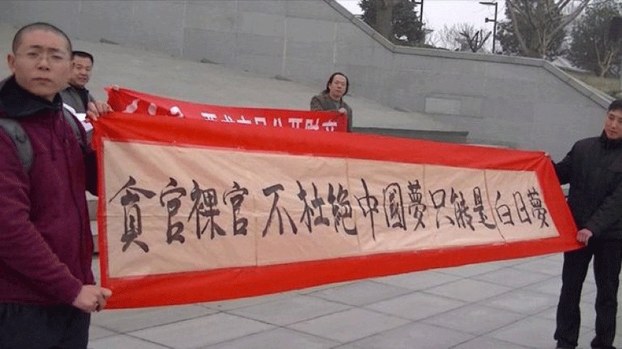




China’s ranking in a global corruption perception index released Wednesday has plummeted from a year ago despite a high profile anti-graft initiative launched by Chinese President Xi Jinping promising to capture officials of all ranks.
Berlin-based Transparency International’s 2014 Corruption Perceptions Index (CPI), which scores countries on a scale of zero (corrupt) to 100 (clean), also saw Southeast Asian nations Vietnam, Laos, Myanmar and Cambodia, as well as North Korea again ranked near the bottom of the list.
China’s score fell to 36 from 40 in 2013, despite economic growth of more than seven percent in each of the last four years, dropping it in rank to 100th among 174 countries from 80 a year ago, and putting it on par with Algeria and Suriname.
“The 2014 CPI shows that economic growth is undermined and efforts to stop corruption fade when leaders and high level officials abuse power to appropriate public funds for personal gain,” said José Ugaz, the chair of Transparency International.
Transparency questioned the effectiveness of Beijing’s top-down approach to battling corruption, suggesting that a lack of transparency, accountable government, and free media and civil society had been its undoing.
It said that China’s commitment to catch “tigers and flies”—public officials big and small—and its launch of a “fox hunt” of officials hiding ill-gotten gains overseas were largely seen as efforts to clamp down on political opponents of the regime, as opposed to genuine anti-corruption measures.
“Given the penetration and impact of colossal corruption to every scale of state and society, the 2014 index score shows the need for a wide range of reforms,” said Srirak Pilpat, regional director of Transparency’s Asia Pacific department.
He noted that China’s attitude towards transparency and governance is important to the wider Asian region, given its growing influence.
“If it spreads an economic model based on less transparency and accountability and excluding civil society, it will bode ill for the corruption fight in other countries too,” he said.
Chinese Ministry of Foreign Affairs spokesperson Hua Chunying took umbrage at Transparency’s findings at a press briefing on Wednesday.
“Scores and ranking on China given by the CPI 2014 is in total contradiction with the remarkable progress China has registered in anti-corruption,” she said.
“Transparency International should seriously examine the objectiveness and impartiality of its CPI.”
Wider region
Srirak said that the index also sends a message to “countries at the crossroads” in Asia—including Myanmar, which scored a 21, and North Korea, which tied Somalia for dead last with a score of eight—that are “grappling with the issue of fighting endemic corruption.”
“It sends a loud statement that leaders must create societies that are more systematically resistant to corruption,” he said.
“That means taking a more inclusive approach to fighting corruption.”
Samantha Grant, Transparency’s Southeast Asia coordinator, noted that the region had an average score of 38, compared to a global average of 43, “and they’re brought up quite a lot by Singapore’s score of 84.”
“Overall, the region—while it may have made some progress in small areas … [is] still really close to the bottom third of the CPI,” she said.
“We’re still seeing some major corruption issues.”
Cambodia improved slightly to 21 from 20 in 2013, based on improvements in its business and political sectors, according to Rath Sophoan of Transparency’s Cambodia board of directors, adding that the country was “moving step by step towards a transparent society.”
However, its neighbors Vietnam and Laos remained at 31 and dropped to 25 from 26, respectively.
Trust at risk
Grant said that Vietnam’s score, which has not changed in three years, reflected that there had “not been quite enough done” by the government, adding that the country’s anti-corruption efforts are “seen as ineffective” and “moving a little bit slower than some of its neighboring countries.”
The country’s inability to improve its ranking put it at risk of “losing public trust and credibility,” and of losing its international reputation, “especially to donors and foreign investor communities,” she said.
“I think that it’s quite a key area that Vietnam should be looking at, to ensure that it doesn’t see foreign investment decreasing and foreign investors reluctant to invest in what can be considered quite a highly corrupt country.”
The report called on governments in the region to do more to fight corruption in the public sector.
“The persistent low scores ask a critical question to the leadership of Asian countries, which have full control of the conduct of its public services,” it said.
“This about the leadership.”
Reported by Joshua Lipes, Samean Yun for RFA’s Khmer Service, and RFA’s Vietnamese Service. Translated by Samean Yun. Written in English by Joshua Lipes.